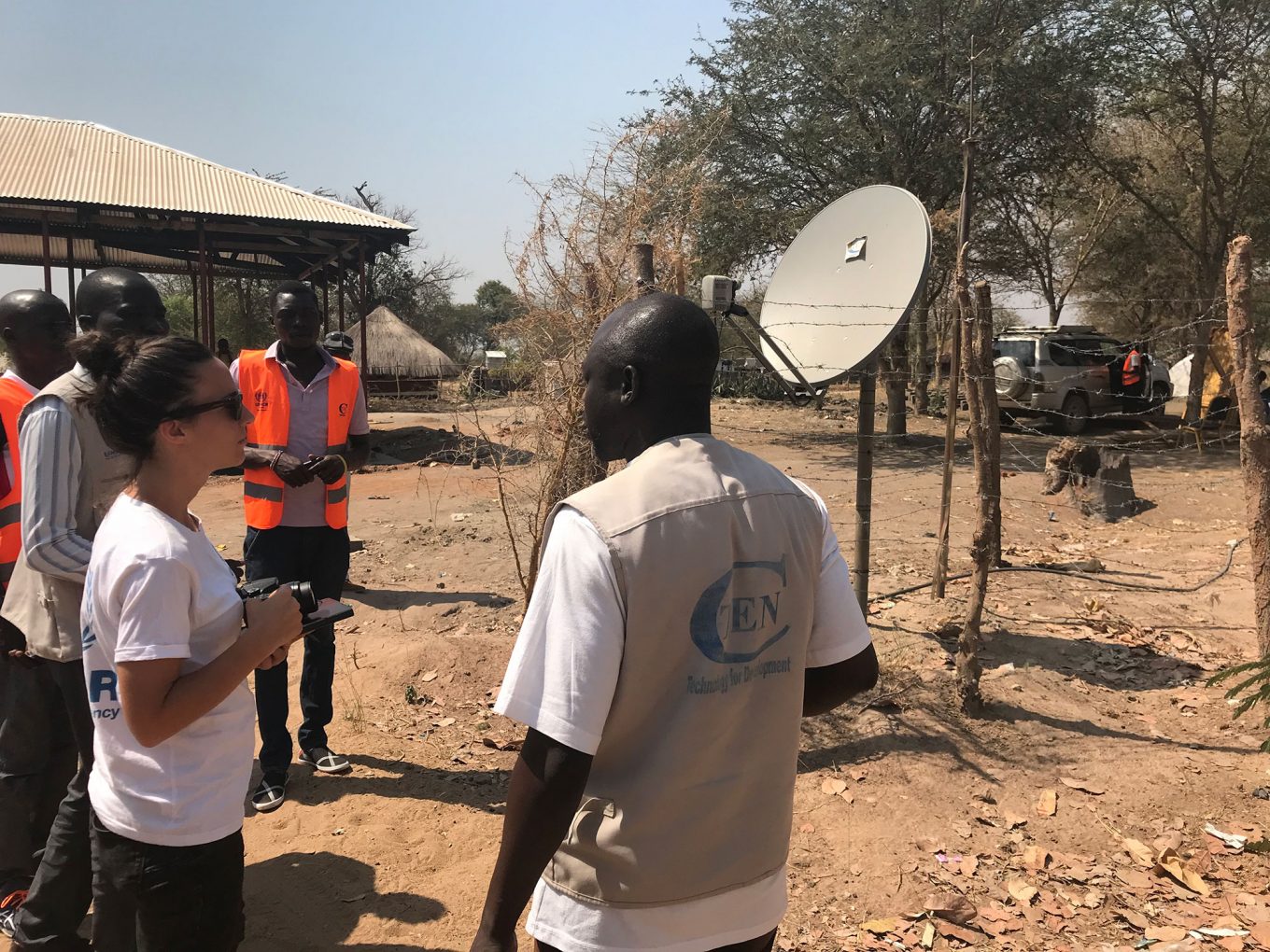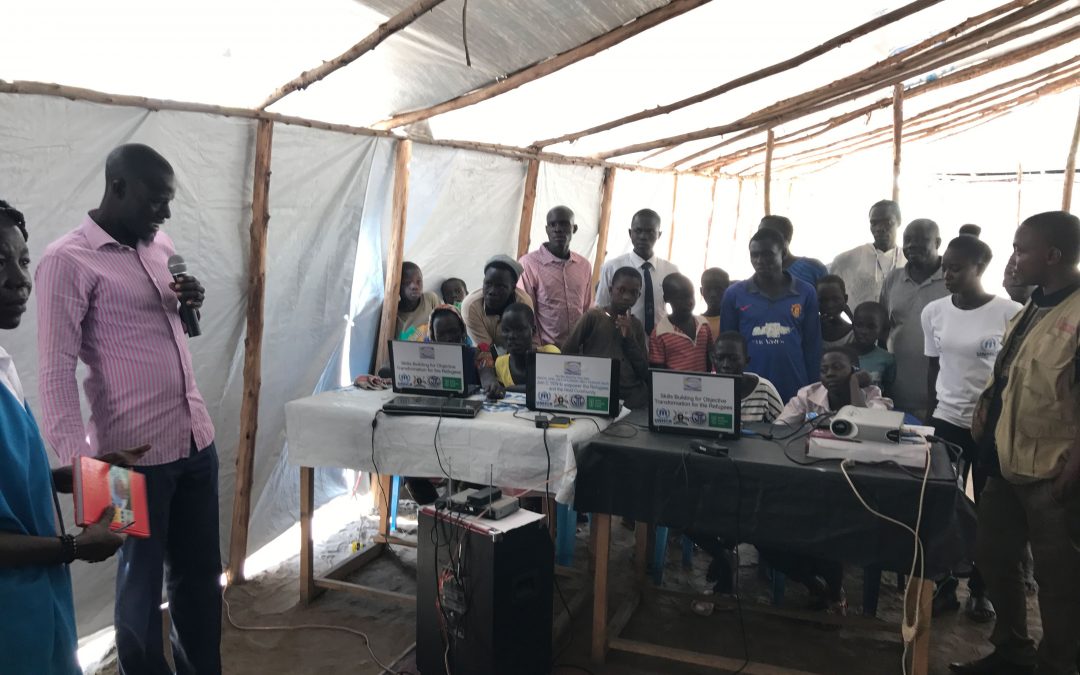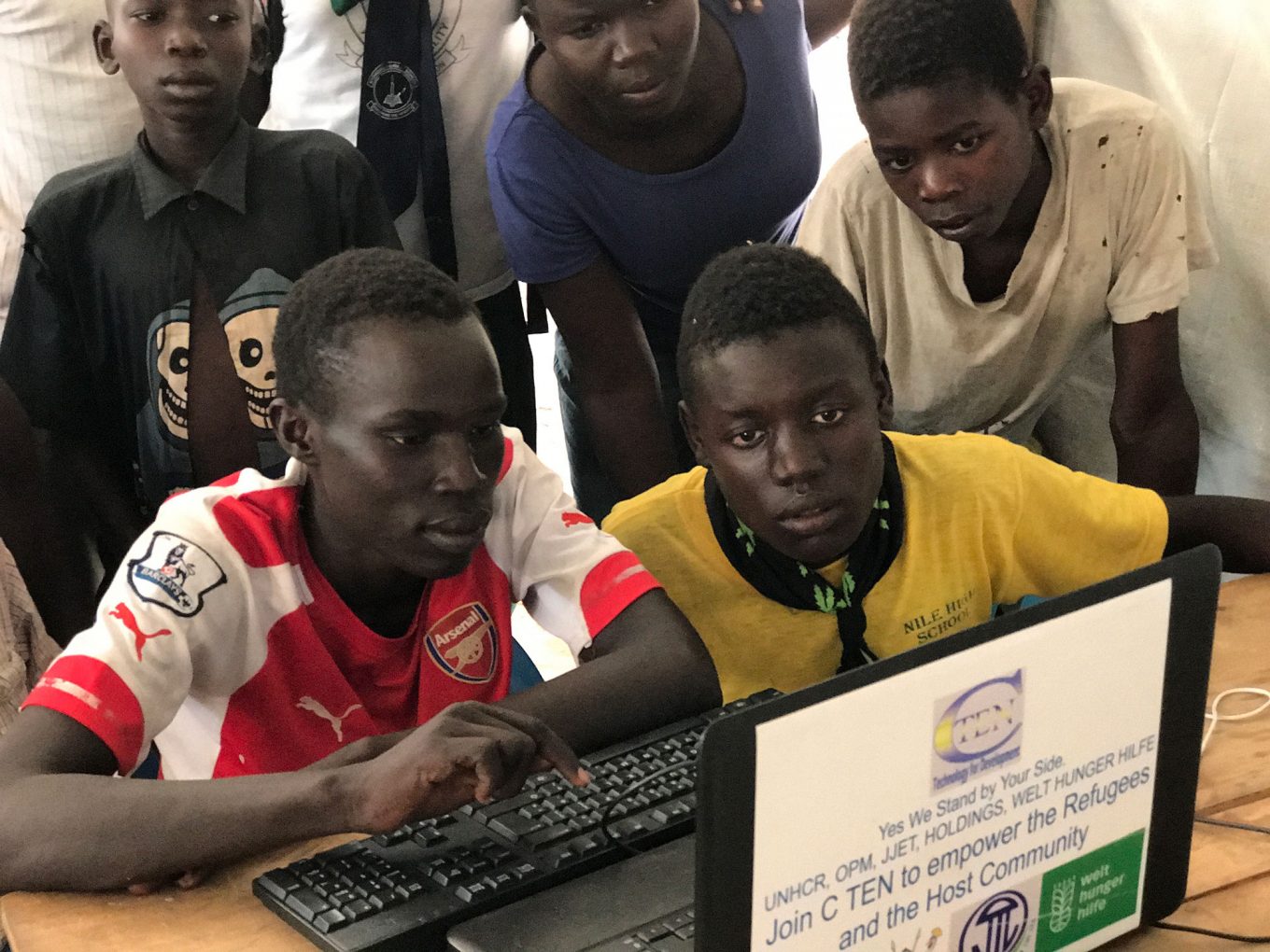Defining it as one of the solutions to address the widening gap between humanitarian needs and available resources, the former UN Secretary General’s High-Level Panel on Humanitarian Financing proposed the Grand Bargain. Essentially, the Grand Bargain is an agreement between more than 30 of the biggest donors and aid providers that lists multiple commitments, most prominent of which being that donors and aid organizations provide 25 percent of global humanitarian funding to local and national responders by 2020. Equally so, the Innovation Service believes in the importance of localization; investing time and resources in building and strengthening capacities in situ is a worthwhile goal.
Although directing resources towards community-based organizations is not a new approach to development agencies and the humanitarian sector, putting such a goal into practice often seems difficult. These difficulties are especially noted when we are reminded of how operations are often under constant pressure, suffer from resource constraints during emergencies, and are subject to humanitarian organizations’ bureaucratic rules and regulations. However, we stand firmly by what the Grand Bargain attempts to accomplish, and to catalyze and unleash existing, local potential, we recommend building new local partnerships, nurturing and expanding upon already existing local partnerships, and working towards addressing the challenges that halt such a process.
CTEN; A Reason To Believe Us
Before we delve deeper into the concrete ways in which we could address collaboration with Community-Based Organizations (CBOs), elaborating on the concrete values such collaboration could bring is due. And there’s no better way to look at such values than by anecdotally reflecting on the work of CTEN – the Community Technology Empowerment Network.
CTEN is an organization dedicated to increasing access and improving the use of information and communication technology in the Rhino Camp Refugee Settlement in Northwestern Uganda. As described by Peter Batalli, founder and executive director of CTEN, the organization aims to “give greater voice, awareness, empowerment, and peace to refugees and host communities in northern Uganda”. The organization is not only one that is based within the community and has direct access to it, but is also led by members of the community; South Sudanese refugees founded CTEN, and the organization employs both refugee and host community members. Primarily, it believes in the power of communication and in empowering people to become literate in modern communications technology.
During our mission in Northern Uganda, we met with Peter and his colleagues and saw the great work the organization does first hand. In a heartwarmingly anecdotal take on CTEN’s origin story, Peter describes how he and his colleagues grabbed a laptop (later named ‘grandma’ due to its long-lasting and ever reliable services) and some other devices when they fled South Sudan to seek refuge in Uganda. Immediately after building their own homes, they started setting up laptops and teaching information and communication technology in their community. Though it faced several challenges along the way, the organization grew into becoming a stable entity, securing funding partners and implementing a wide range of activities. This stability grew out of partnerships with community members, the South Sudanese diaspora, the Ugandan Office of the Prime Minister, UNHCR and its implementing partners. Frankly, we were also impressed by our own colleagues’ and partners’ commitment to support these smaller local organizations.

Why Work with CBOs?
We bring up CTEN for two reasons: First, we need to celebrate refugee-led innovation and refugee-led CBOs every chance we get, and second, our partnership with CTEN, along with the experience and perspective they offer into the discussion at hand, allows us to understand the value working with CBOs brings. From our interaction with CTEN in Uganda, and based on our previous experiences and conversations with various colleagues in the field, we’ve identified inherent advantages to working with CBO. However, please keep in mind this list is not exhaustive, and any missed advantages would greatly be appreciated, as they only serve to reinforce the main argument we’re putting forward: work with CBOs!
- Best of Both Worlds: Working with smaller, community-based organizations allows you to develop wider outreach efforts with much fewer resources. In lessening the possibility for effort duplication between CBOs and larger international organizations’ efforts and funding smaller organizations, larger international organizations can reduce management costs and allow smaller organizations to take charge in the solution-creating process. Because such smaller organizations are more than likely located within the physical space of the community that they are serving, they reach a wider audience using much less effort.
- C is the Most Important Letter: In a CBO, members often live within the community, which brings in multiple advantages that are often not afforded to international organizations. Such advantages include that members often speak the language(s) of the community, are intimately aware of the issues, idiosyncrecies, norms, and practices of the community, understand the community structures and power dynamic set in place, and are vigilant of the existing capacities within the community.
- Like LinkedIn, but Not Really and a Whole Lot Better: Because of their familiarity with the community they are both a part of and serve, local CBOs are equipped better at communicating appropriately through their existing networks. These networks are extremely valuable and ones that can either be enhanced, or be a doorway for more networks to be created.
- Community-Led Innovation: Because of the lived experiences community members in CBOs went through, the environment community members in CBOs are often surrounded by, and the necessity with which they find themselves facing, CBOs are often made up of innovators who are more willing to work on new, effective ideas. They are also more inclined to adopt the experimenting mentality of trial and error.
- Let the Positive Juices Flow: Working with CBO’s provides both a metaphysical sense of hope for change, and livelihood opportunities for refugees and host community members. It also sends a positive message of an active pursuit of betterment to local and international communities, leading to the further growth of CBOs as such communities seek to partner in the process of humanitarian assistance.
We realize that this list is not exhaustive, and we also realize that these advantages and values are not ones that apply to every CBO, however, they are ones that we took note of when working with CBOs. It is important to try and detach ourselves from trying to tokenize CBOs as a single entity with the exact same characteristics.
What Are the Challenges of Working with CBOs?
A sum of challenges arises when large humanitarian organizations and smaller community-based organizations attempt to foster collaborative efforts between each other. An interesting case study to further examine such challenges is in our own backyard – UNHCR’s work with CBOs.
In collaborating with CBOs, an operation will need to enter into a partnership agreement process – within UNHCR these are mostly likely to be ‘small’ partnership agreements with a capped funding ceiling. We discussed with colleagues as well as members of CBOs that are currently working with UNHCR, including CTEN’s finance officer, about the challenges they face in such agreements. In response, we were met with equally valuable accounts of what can be defined as a challenge on both ends of the agreement. Moreover, although the group of challenges that face CBOs in relation to a partnership agreement are specifically presented through a UNHCR case-study lense, we have to note that these challenges are not UNHCR-specific, but rather indicative of challenges within the humanitarian system as a whole.
- No One Likes Bureaucracy: As described by CTEN’s financial officer and multiple other colleagues in several CBOs, UNHCR’s bureaucratic processes are not conducive of fully productive partnership-centred endeavors. Namely, CBOs including CTEN feel that UNHCR provides little introduction and follow-up explanations of the forms and reporting procedures involved in the partnership agreement. Moreover, they often get the impression that UNHCR’s control mechanisms purely look at the end-product of a partnership agreement as opposed to the endeavor itself; a rather inhibiting mechanism to the partnership’s success. They argue that such a control mechanism is often a direct result of bureaucratic constraints.
- Lack of Secure and Sustainable Financial Structures: For a lot of international organizations including the UNHCR, CBOs’ accounting procedures and organizational structures may be problematic when assessed against the standards of UNHCR. This could be the result of such procedures and structures being in the early stages of a growing organization, or a result of the norms of how accounting procedures and organizational structures often function in the community. An example of this is how procurement is often done in cash, and even on credit, and may lack standardized procedures. This lack of standardized procedures often results in missing stationeries, incomplete proofs of expenditure, and a lacking standard of documentation.
- Human Resources Without the Resources: More often than not, CBOs struggle with Human Resource management. The challenge in itself is composed of several layers that coalesce to become one troubling hindrance. There is often a struggle with getting qualified staff through transparent and fair recruitment processes, as well as problems in vetting, applying assessments, increasing diversity in teams, and implementing staff tracking and time effort tracking procedures.
- Overburdening of CBOs: There is a big concern that lies with the way in which UNHCR, partners, and/or donors choose to fund CBOs. Namely, once such international organizations find a CBO that they deem capable and reliable, they all engage with that single CBO. The concern lies in “drowning” the CBO with various partnership agreements all at once from different organizations. This generates a lot more responsibility than a CBO can generally handle, including a large amount of funding, a ton of reporting requirements, and a large sum of agreement conditions to follow. These funds, requirements, and conditions are a responsibility and the inherent danger of misconduct, not limited to CBOs and applicable to any organization receiving funding, is present.
- Data Data Data: In partnering with CBOs, there are high data protection risks. CBOs often do not have a physical office and tend to walk around with documents, heightening the probability of misplacing the documents, losing them completely, or have them be subject to theft. The data storage procedures often do not comply with minimum data protection standards of international organizations.
- DIfficult Organizational Structure: CBOs often lack an organizational structure that enables the transition of checks and balances in a structured, trustworthy manner; some organisations are managed by an individual and thus only have one signatory and all the power sits with that one person.
So, What Do We Do?
It seems rather counterproductive if we were to emphasize the importance of working with CBOs and the values such work brings, and not present some solutions to the challenges presented earlier. Lucky for you, we’d like to believe the Innovation Service isn’t that counterproductive and have thus gathered, in working with CBOs and colleagues in the field, several tangible ways to deal with the challenges presented and how to practically approach working with CBOs in general.
- Mission-Supporting CBO: In order to establish a sustainable partnership that is built on continued mutual support and drive towards ameliorating the plights of refugees, international organizations should actively scope for CBOs that reflect their own mission. In the case of UNHCR, such a scoping mechanism applies both to colleagues from operations around the world and colleagues serving on a mission. Upon finding a CBO that, for example, indiscriminately aims to help refugees settle, it is imperative to invest time and resources into its growth in terms of capacities and abilities to achieve the mission.
- Did We Mention How Important the Letter C is? Communication is key in establishing sustainable, productive partnerships with CBOs. A regular session to communicate thoughts, plans of action, concerns, and progress of specific goals between the partner and the CBO is important and highly encouraged (e.g. regular monthly meetings). Staff within the partner organization should also focus on communicating with colleagues in other operations on how to best engage with CBOs by learning from each others experiences. This communication facilitates a “growth-through-experimentation” mentality, a notion that is highly imperative to innovation and growth.
- Reporting and Finance ~ Enable-Push-Pull: Addressing a CBO’s setbacks when it comes to the lack of secure organizational and financial structures is vital to the success of a partnership. The Enable-Push-Pull approach betters such structures into becoming more secure and effective. These can be divided as follows:
- Enable: Enabling is achieved as providing support in reporting, financial management, project management, and organizational development before, during, and after project implementation.
- Pull: Pulling is defined as establishing simple but effective reporting procedures, which include aspects from the communication efforts earlier presented that include scheduling regular sessions between the partner organization and CBOs to report on progress.
- Push: Pushing is defined as applying frequent control mechanisms that ensures a CBO both commits to the goals discussed with UNHCR, and follows the specific standards set by the partner organization that guarantees a successful operation.
- A Signing Party: It is important to spread the decision-making power in any governing structure, thus rearranging the governing structure of a CBO to include a board that overlooks the overall work of the organization, and having several signatories, allows for a fairer decision-making process.
- Don’t Drown, Phase Instead! Instead of overburdening CBOs by introducing a large batch of funds, requirements, and conditions initially and expecting unrealistic outcomes in the long run, employ a phased approach to allow both the partner organizations and CBOs to grow at their own pace. Starting with twinning or small partnership before entering full partnership agreements, either by pairing CBOs with an NGO or INGO to jointly work on projects agreements, or connecting different CBOs within the operation to enable peer-to-peer exchange and collaboration, allows CBOs to gradually scale and achieve the goals the agreement aims to achieve.
- Staff the Staff: As means to address issues with staffing in CBOs, the partner’s staff members and the CBO staff should evaluate, asses, and update their staff-related mechanisms, such as employment, as means to build capacity more efficiently. This should also be reflected in the staff members Terms of Reference. In building such scoping mechanism, especially in hiring staff, colleagues should urge CBOs to employ staff of all genders and of all cultural and religious affiliations, especially those marginalized in the majority population. To foster and strengthen peaceful coexistence within a space that is otherwise hostile, UNHCR colleagues should motivate CBOs to employ both refugees and host community members.
- The Innovation Service Asks that You… Innovate! Surprise: We encourage the partner organization’s staff who are aware of the Innovation Approach to share their knowledge and capacitate CBO staff (as well as fellow staff members) on such an approach. This is not a one-way process, as staffers should also bear in mind and look out for refugee-led innovation that can foster and built upon. The Approach should center experimentation rooted in collaboration, and in testing small ideas in hopes of scaling them to have bigger applications in the future.
- Be Realistic about Expectations: Adapting the partner organization’s auditing standards to the local conditions, circumstances, and standards that surround the CBO is vital to the success of a partnership agreement between partners and CBOs. In finding a middle ground of auditing standards, communicate such adaptations as a “learning opportunity” for both, as opposed to it being a form of “policing.”
The Final Scoop
- We cannot stress enough how important it is to establish partnerships with community-based organizations. In our pursuit to protect and serve refugees and displaced communities, we need to understand that the people we serve should also be members in the decision-making process; they are active participants in the amelioration of their own plights, not passive victims of it. Thinking of humanitarian organizations as structures completely detached and independent of the very communities they are trying to serve is counterproductive to the values-based partnerships we need to prioritize. Establishing partnership agreements will bring communities closer to the organizations that serve and protect them. We are urging international organizations in the humanitarian sector to develop official operational guidelines on how to better engage and support CBOs to ultimately enhance refugee protection and enable refugees to improve their lives.
We’re always looking for great stories, ideas, and opinions on innovations that are led by or create impact for refugees. If you have one to share with us send us an email at [email protected]
If you’d like to repost this article on your website, please see our reposting policy.


